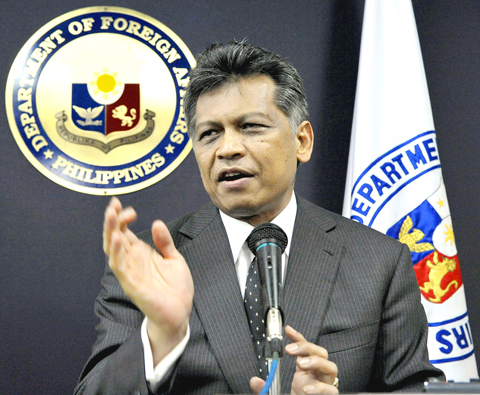Surin Pitsuwan can quote from both the Koran and English poetry, in the same speech.
The self-professed “cheerleader in chief of ASEAN” at times sounds like a preacher, and his outspoken style may seem at odds with the 41-year-old history ASEAN, which he has led as secretary-general since the start of the year.
ASEAN has long been criticized as little more than a “talking shop” unable to play a meaningful role in the region.

PHOTO: AFP
But observers say that if anyone can make ASEAN more effective, it is Surin, 58, a Muslim former Thai foreign minister and academic who hails from his country’s south.
“He’s much more dynamic,” said Carl Thayer, a Southeast Asian specialist at the Strategic and Defence Studies Centre of the Australian National University.
“He wants to do something. He’s not serving time till retirement,” Thayer said. “I would be more confident that ASEAN would advance under his leadership.”
Surin took over on Jan. 1 for a five-year term with a beefed-up mandate to give the organization a higher international profile from his base in Jakarta.
He has been promoting the ASEAN Charter, a landmark document that gives ASEAN a legal framework, sets out the principles and rules for members, and commits the region’s disparate nations to promote human rights and democracy.
ASEAN admitted only about 30 percent of its agreements and commitments have been implemented.
But under the new charter, the secretary-general is charged with monitoring implementation of the bloc’s pledges, and reporting back to ASEAN’s annual summit. He is also the public face of the grouping.
The 10 ASEAN members signed the charter at the group’s summit last November but each country must ratify it domestically. Surin is optimistic that will be done by year’s end.
A former ASEAN secretary-general, Rodolfo Severino, said Surin’s activist inclination fits with the expanded mandate given to the ASEAN chief under the charter.
“Surin has been very good for the organization,” Severino said.
As a former foreign minister, he brings a stature that those who preceded him did not, Severino said.
“Second, he takes initiatives,” Severino said.
Surin and the charter are a good fit, said Thayer, calling him “the best one to get behind the wheel.”
Surin describes his style as “hands on, accessibility.”
He said ASEAN turned to him because they wanted a secretariat that is proactive and can communicate effectively.
“And to that extent, I think they know that I need a space, I need some flexibility in order to execute the mandate, the responsibility, being added to the secretariat,” he said during an interview at the close of ASEAN meetings earlier this year in Singapore.
ASEAN saw his previous political experience as an asset, Surin said. Since Surin took office, the Jakarta Secretariat has issued a stream of press releases about ASEAN activities and statements, helping to raise the bloc’s profile.

Quanta Computer Inc (廣達) chairman Barry Lam (林百里) is expected to share his views about the artificial intelligence (AI) industry’s prospects during his speech at the company’s 37th anniversary ceremony, as AI servers have become a new growth engine for the equipment manufacturing service provider. Lam’s speech is much anticipated, as Quanta has risen as one of the world’s major AI server suppliers. The company reported a 30 percent year-on-year growth in consolidated revenue to NT$1.41 trillion (US$43.35 billion) last year, thanks to fast-growing demand for servers, especially those with AI capabilities. The company told investors in November last year that

Taiwanese suppliers to Taiwan Semiconductor Manufacturing Co. (TSMC, 台積電) are expected to follow the contract chipmaker’s step to invest in the US, but their relocation may be seven to eight years away, Minister of Economic Affairs J.W. Kuo (郭智輝) said yesterday. When asked by opposition Chinese Nationalist Party (KMT) Legislator Niu Hsu-ting (牛煦庭) in the legislature about growing concerns that TSMC’s huge investments in the US will prompt its suppliers to follow suit, Kuo said based on the chipmaker’s current limited production volume, it is unlikely to lead its supply chain to go there for now. “Unless TSMC completes its planned six

Intel Corp has named Tasha Chuang (莊蓓瑜) to lead Intel Taiwan in a bid to reinforce relations between the company and its Taiwanese partners. The appointment of Chuang as general manager for Intel Taiwan takes effect on Thursday, the firm said in a statement yesterday. Chuang is to lead her team in Taiwan to pursue product development and sales growth in an effort to reinforce the company’s ties with its partners and clients, Intel said. Chuang was previously in charge of managing Intel’s ties with leading Taiwanese PC brand Asustek Computer Inc (華碩), which included helping Asustek strengthen its global businesses, the company

Power supply and electronic components maker Delta Electronics Inc (台達電) yesterday said second-quarter revenue is expected to surpass the first quarter, which rose 30 percent year-on-year to NT$118.92 billion (US$3.71 billion). Revenue this quarter is likely to grow, as US clients have front-loaded orders ahead of US President Donald Trump’s planned tariffs on Taiwanese goods, Delta chairman Ping Cheng (鄭平) said at an earnings conference in Taipei, referring to the 90-day pause in tariff implementation Trump announced on April 9. While situations in the third and fourth quarters remain unclear, “We will not halt our long-term deployments and do not plan to